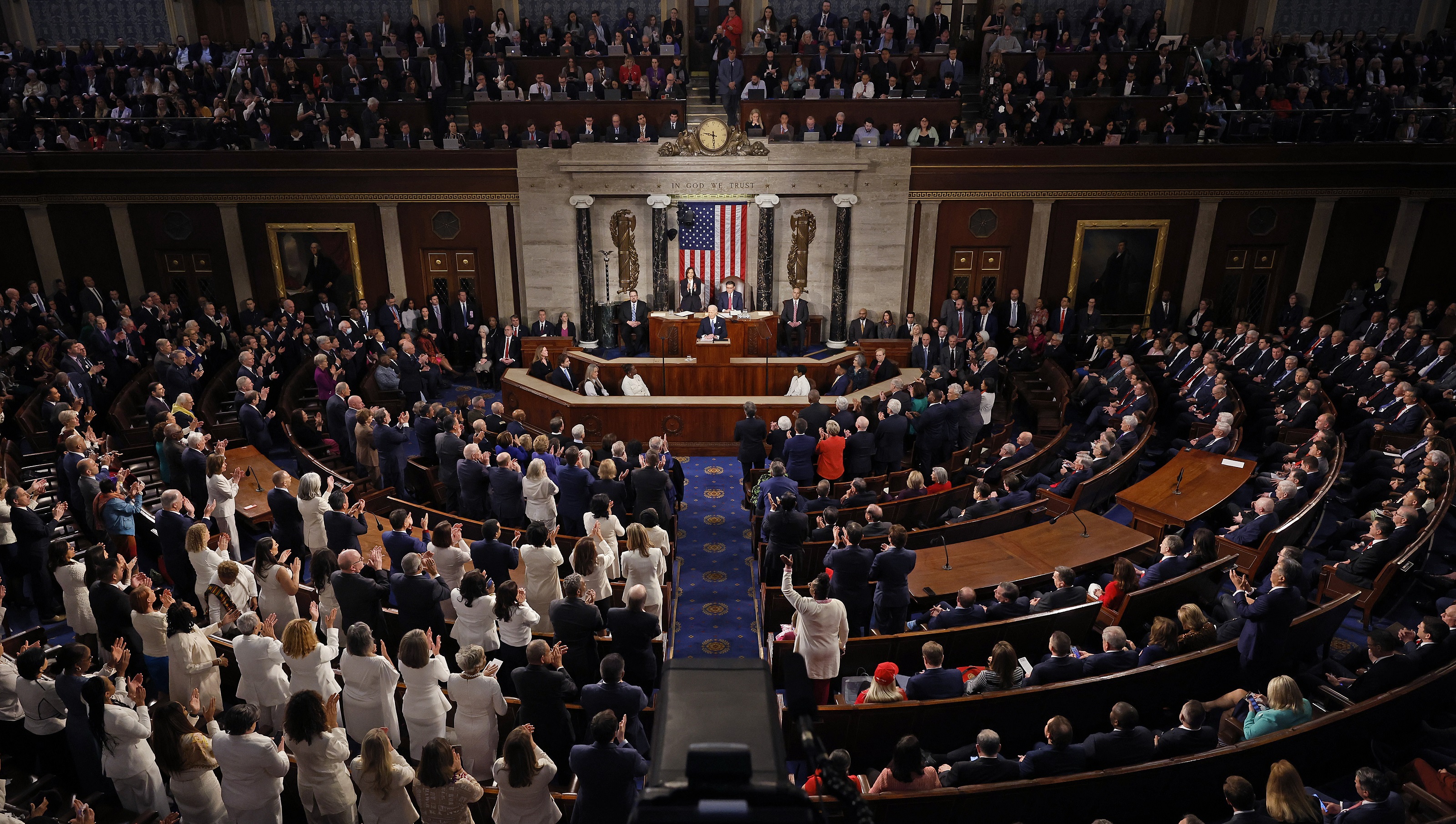Biden Spotlights Drug Prices, Medicare, Social Security in State of the Union
Biden calls for expanding Medicare drug price negotiations to include up to 500 drugs over next decade.


Profit and prosper with the best of Kiplinger's advice on investing, taxes, retirement, personal finance and much more. Delivered daily. Enter your email in the box and click Sign Me Up.
You are now subscribed
Your newsletter sign-up was successful
Want to add more newsletters?

Delivered daily
Kiplinger Today
Profit and prosper with the best of Kiplinger's advice on investing, taxes, retirement, personal finance and much more delivered daily. Smart money moves start here.

Sent five days a week
Kiplinger A Step Ahead
Get practical help to make better financial decisions in your everyday life, from spending to savings on top deals.

Delivered daily
Kiplinger Closing Bell
Get today's biggest financial and investing headlines delivered to your inbox every day the U.S. stock market is open.

Sent twice a week
Kiplinger Adviser Intel
Financial pros across the country share best practices and fresh tactics to preserve and grow your wealth.

Delivered weekly
Kiplinger Tax Tips
Trim your federal and state tax bills with practical tax-planning and tax-cutting strategies.

Sent twice a week
Kiplinger Retirement Tips
Your twice-a-week guide to planning and enjoying a financially secure and richly rewarding retirement

Sent bimonthly.
Kiplinger Adviser Angle
Insights for advisers, wealth managers and other financial professionals.

Sent twice a week
Kiplinger Investing Weekly
Your twice-a-week roundup of promising stocks, funds, companies and industries you should consider, ones you should avoid, and why.

Sent weekly for six weeks
Kiplinger Invest for Retirement
Your step-by-step six-part series on how to invest for retirement, from devising a successful strategy to exactly which investments to choose.
President Joe Biden touted his administration’s achievements so far and vowed to protect Social Security and Medicare and fight high drug prices as he addressed the nation in his State of the Union address last night (March 7).
"Tonight, let's all agree once again to stand up for seniors. Many of my friends on the other side of the aisle want to put Social Security on the chopping block," he said. "Anyone here who tries to cut Social Security, Medicare or raise the retirement age, I will stop you."
With the general election just months away, Biden tackled a range of issues and called on Congress to expand certain provisions under his landmark Inflation Reduction Act (IRA). These include the Medicare Drug Price Negotiations program, which allows Medicare for the first time to enter pricing talks with drugmakers to reduce the costs of some of the highest-priced Part D drugs prescribed in the U.S.
From just $107.88 $24.99 for Kiplinger Personal Finance
Become a smarter, better informed investor. Subscribe from just $107.88 $24.99, plus get up to 4 Special Issues

Sign up for Kiplinger’s Free Newsletters
Profit and prosper with the best of expert advice on investing, taxes, retirement, personal finance and more - straight to your e-mail.
Profit and prosper with the best of expert advice - straight to your e-mail.
Negotiations are now underway for the first 10 drugs under the program, and plans call for adding up to 60 more drugs to the program during the next four years and up to 20 additional drugs per year after that.
Last night, the president called for adding 500 drugs over the next decade.
"We finally gave Medicare the power to negotiate, just like the VA is able to do for veterans," he said. "That's not just saving seniors money. It's saving taxpayers money. We cut the federal deficit by $160 billion because Medicare will no longer have to pay those exorbitant prices to Big Pharma."
Next year under the same law, total prescription drug costs for Medicare beneficiaries will be capped at $2,000 annually. Biden said he wants to cap these costs at $2,000 for everyone.
"I'm also getting rid of junk fees," Biden said, highlighting his administration’s proposed rules to eliminate junk or hidden fees in a range of markets including banking, cable and travel. He noted the recent finalization of the junk fee banking rule that caps credit card late fees at $8, down from the current $32.
Republican response to the State of the Union
Biden, who spoke before a joint session of Congress, faces tough opposition from Republicans on many of his policies and programs. His delivered the address just two days after the Super Tuesday primaries, where former President Donald Trump swept the GOP nomination in most states and is the presumptive nominee to square off against him in the 2024 presidential race.
Last night was a key opportunity for Biden to claim economic victories for his administration, given low consumer sentiment about the economy as Americans faced inflation and uncertainty in the wake of the COVID pandemic.
Sen. Katie Boyd Britt (R-AL), the youngest Republican woman ever elected to the Senate, delivered the GOP response following Biden’s address, saying that the president "just doesn't get it."
She said that families are worse off under his administration. "Hardworking families are struggling to make ends meet today. And with soaring mortgage rates and sky-high childcare costs, they're also struggling to plan for tomorrow," she said.
RELATED CONTENT
Profit and prosper with the best of Kiplinger's advice on investing, taxes, retirement, personal finance and much more. Delivered daily. Enter your email in the box and click Sign Me Up.

Esther D’Amico is Kiplinger’s senior news editor. A long-time antitrust and congressional affairs journalist, Esther has covered a range of beats including infrastructure, climate change and the industrial chemicals sector. She previously served as chief correspondent for a financial news service where she chronicled debates in and out of Congress, the Department of Justice, the Federal Trade Commission and the Commerce Department with a particular focus on large mergers and acquisitions. She holds a bachelor’s degree in journalism and in English.
-
 Dow Leads in Mixed Session on Amgen Earnings: Stock Market Today
Dow Leads in Mixed Session on Amgen Earnings: Stock Market TodayThe rest of Wall Street struggled as Advanced Micro Devices earnings caused a chip-stock sell-off.
-
 How to Watch the 2026 Winter Olympics Without Overpaying
How to Watch the 2026 Winter Olympics Without OverpayingHere’s how to stream the 2026 Winter Olympics live, including low-cost viewing options, Peacock access and ways to catch your favorite athletes and events from anywhere.
-
 Here’s How to Stream the Super Bowl for Less
Here’s How to Stream the Super Bowl for LessWe'll show you the least expensive ways to stream football's biggest event.
-
 We're 62 With $1.4 Million. I Want to Sell Our Beach House to Retire Now, But My Wife Wants to Keep It and Work Until 70.
We're 62 With $1.4 Million. I Want to Sell Our Beach House to Retire Now, But My Wife Wants to Keep It and Work Until 70.I want to sell the $610K vacation home and retire now, but my wife envisions a beach retirement in 8 years. We asked financial advisers to weigh in.
-
 How to Add a Pet Trust to Your Estate Plan: Don't Leave Your Best Friend to Chance
How to Add a Pet Trust to Your Estate Plan: Don't Leave Your Best Friend to ChanceAdding a pet trust to your estate plan can ensure your pets are properly looked after when you're no longer able to care for them. This is how to go about it.
-
 Want to Avoid Leaving Chaos in Your Wake? Don't Leave Behind an Outdated Estate Plan
Want to Avoid Leaving Chaos in Your Wake? Don't Leave Behind an Outdated Estate PlanAn outdated or incomplete estate plan could cause confusion for those handling your affairs at a difficult time. This guide highlights what to update and when.
-
 I'm a Financial Adviser: This Is Why I Became an Advocate for Fee-Only Financial Advice
I'm a Financial Adviser: This Is Why I Became an Advocate for Fee-Only Financial AdviceCan financial advisers who earn commissions on product sales give clients the best advice? For one professional, changing track was the clear choice.
-
 Quiz: Are You Ready for the 2026 401(k) Catch-Up Shakeup?
Quiz: Are You Ready for the 2026 401(k) Catch-Up Shakeup?Quiz If you are 50 or older and a high earner, these new catch-up rules fundamentally change how your "extra" retirement savings are taxed and reported.
-
 65 or Older? Cut Your Tax Bill Before the Clock Runs Out
65 or Older? Cut Your Tax Bill Before the Clock Runs OutThanks to the OBBBA, you may be able to trim your tax bill by as much as $14,000. But you'll need to act soon, as not all of the provisions are permanent.
-
 We Inherited $250K: I Want a Second Home, but My Wife Wants to Save for Our Kids' College.
We Inherited $250K: I Want a Second Home, but My Wife Wants to Save for Our Kids' College.He wants a vacation home, but she wants a 529 plan for the kids. Who's right? The experts weigh in.
-
 I'm a Financial Adviser: This Is the $300,000 Social Security Decision Many People Get Wrong
I'm a Financial Adviser: This Is the $300,000 Social Security Decision Many People Get WrongDeciding when to claim Social Security is a complex, high-stakes decision that shouldn't be based on fear or simple break-even math.